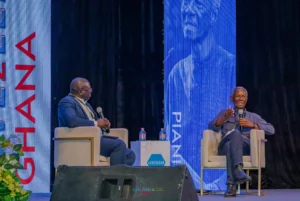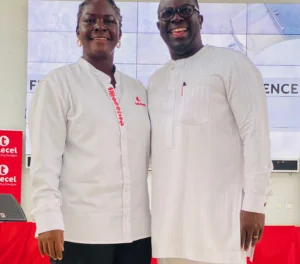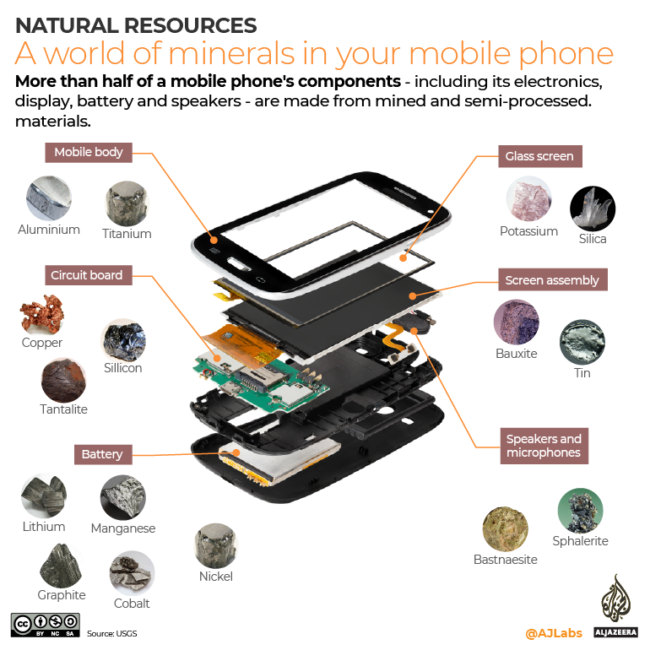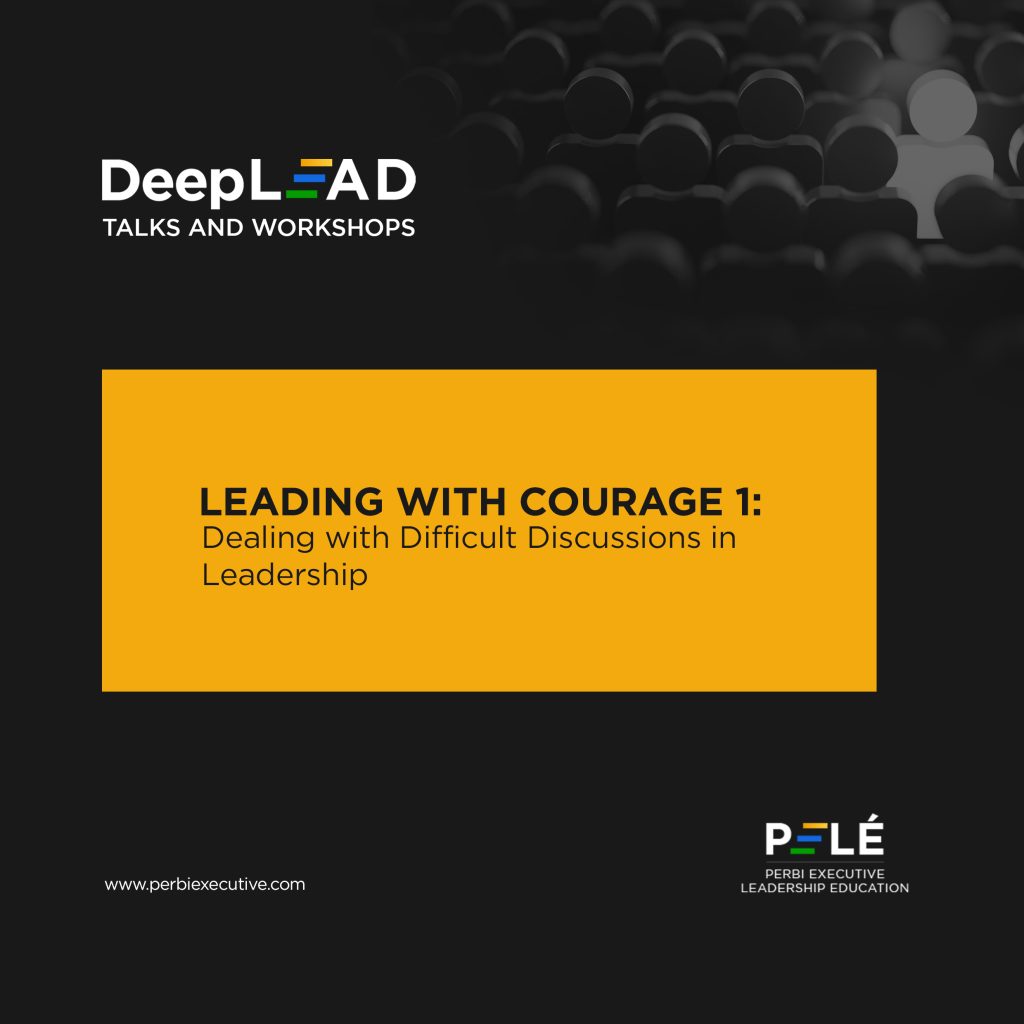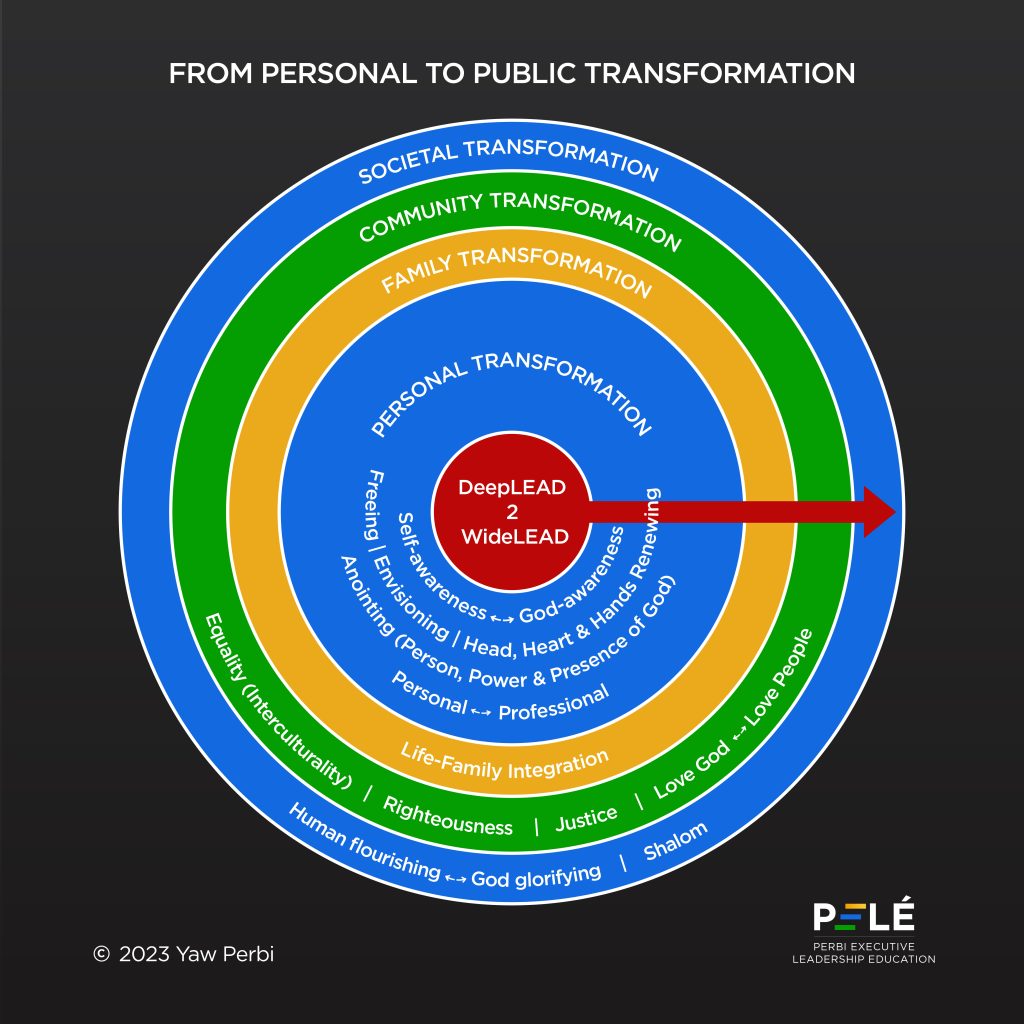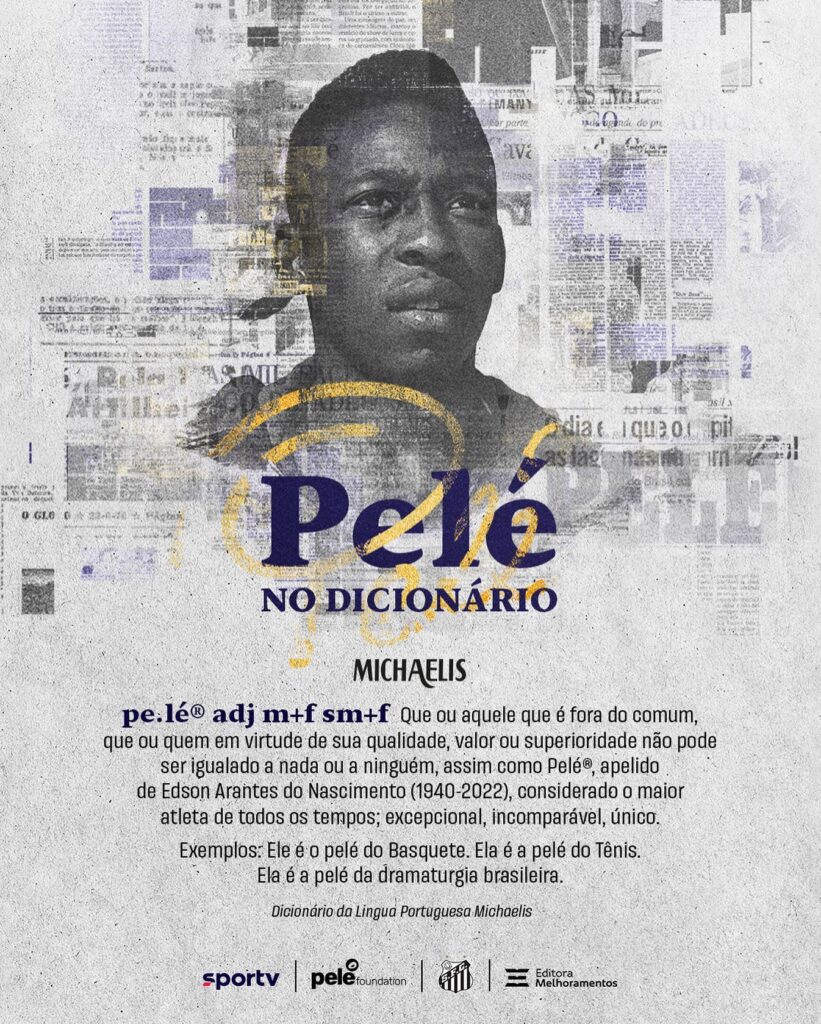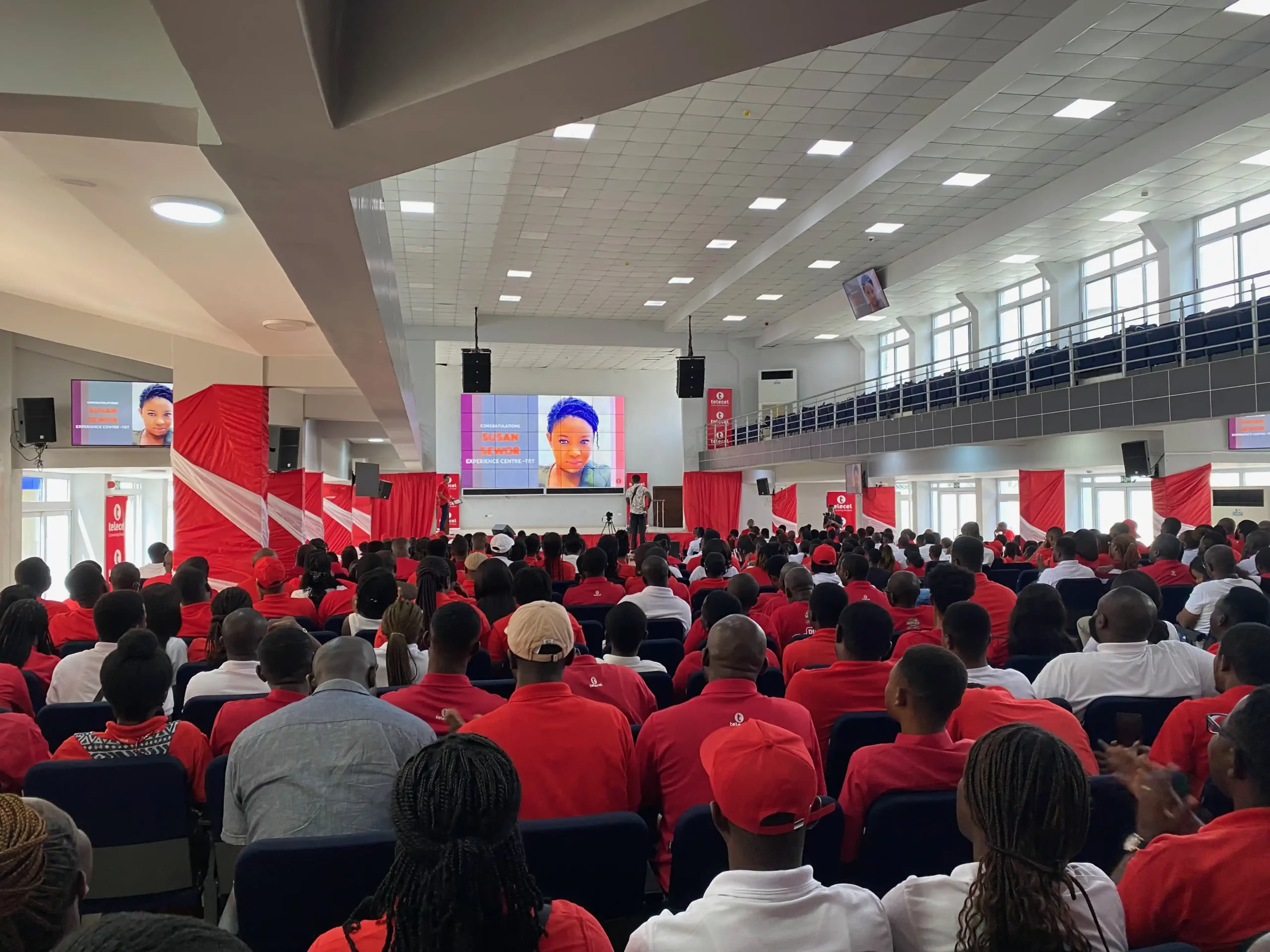
INTRAPRENEURS: THE ENTREPRENEURS WITHIN
INTRODUCTION
Telecel Ghana, formerly Vodafone Ghana, has an amazing annual practice of bringing together its 1,300-strong frontliners to appreciate them—not just with words but in awards—and ginger them up to do even better for their clientele. This Frontline Engagement Conference, as they call it, typically happens during the global Customer Service Week in October, which they’ve extended to the whole month to appreciate their customers.
This year, as the principal coach/speaker/trainer at Perbi Executive Leadership Education (PELÉ), Telecel extended to yours truly the humbling opportunity to address their army of frontliners and frontline support staff. Frontliners mean everything to any business! They are essential workers whose jobs depend on in-person interactions and often involve some form of risk, even if it’s verbal abuse. If this were soccer, frontliners would be our strikers! No scoring on this front, no bottomline success. Period. I was particularly impressed that the CEO of Telecel, Ing. Patricia Obo-Nai, prioritised this event such that not only was she in attendance from start to finish, she was fully present and participatory to the max.
This article aims to summarise the keynote I delivered on behalf of PELÉ entitled, “WANTED: INTRAPRENEURS!” This burning message to the rank and file of a top-tier provider of digital and telecommunications solutions across the African continent is one which, quite frankly, every company and organisation needs to hear.
FUNNY BUT NOT FUNNY
Several years ago, I had an appointment in downtown Accra but needed to pass through the bank to make a transaction first. I waited and waited and waited… and it was becoming evident that I might miss my appointment altogether. So, I got up and approached one of the bankers to express both my frustration and concern that I needed to make it for an appointment and here I was stuck in the bank.
Here was her response (I kid you not; and I remember as though it were yesterday): “Nti wonni time na w’aba bank no?” she said in Twi. To wit, “So you don’t have time and you came to the bank?” Needless to say, I was stupefied; or rather, mortified. If there ever was the opposite of a staff being intrapreneurial, it is that!
DEFINING INTRAPRENEUR(SHIP)
Everyone knows about entrepreneurs and entrepreneurship. But what in the world is an intrapreneur—and then intrapreneurship? To cover our bases, Investopedia defines an entrepreneur as “an individual who creates a new business, bearing most of the risks and enjoying most of the rewards. The process of setting up a business is known as entrepreneurship. The entrepreneur is commonly seen as an innovator, a source of new ideas, goods, services, and business/or procedures” (emphases mine).
With that at the back of our minds, the simplest definition of an intrapreneur would be an employee who behaves like an entrepreneur. Rather than going out to create a new business/organisation, they stay within it and use their innate entrepreneurial aptitudes and attitudes to significantly grow it. Gifford Pinchot III (1985) defined intrapreneurs as, “Dreamers who do. Those who take responsibility for creating an innovation of any kind within an organisation.” He is credited with inventing the concept of intrapreneurship in a paper that he and his wife, Elizabeth Pinchot, wrote in 1978 titled “Intra-Corporate Entrepreneurship.” Intrapreneurs then, are entrepreneurs within–within themselves and within their organisations/businesses.
DIGGING DEEPER
Intrapreneurs have an attitude and style that integrates Responsibility, Risk-taking, Ownership, Innovation (ROI). I like that these basic characteristics spell ROI, literally portraying how it’s entrepreneurs who bring a company its best Return on Investment (ROI). Roi, the French word for king, is also apt, for intrapreneurs are royalty in establishments, they are the kings and queens of any business. In 2014, Forbes declared that intrapreneurs are the most valuable employees from here on out. “Social intrapreneurs are quickly becoming the most valuable employees at many companies because they are good for the bottom line, good for the brand, and good for staff morale.” [1]
At the core of ROI is ownership, owning the opportunities and challenges at the workplace, assessing situations and taking responsibility (the R again) for one’s attitude, behaviour and outcomes. Here is where I challenge Management about ensuring they provide the legal and logistical framework—as well as whatever enabling environment—that empowers employees to take initiative and risk to innovatively solve problems boldly. A great example is the Ritz-Carlton hotel chain which has for many years given staff $2,000 of discretion to be used to solve any customer complaint in the manner the employee feels is appropriate. And this is daily! I recall hearing the author of The New Gold Standard: 5 Leadership Principles for Creating a Legendary Customer Experience Courtesy of The Ritz-Carlton Hotel Company tease out how this incentive works in practice and that the training is that if a customer/guest/client reports an issue to you, you own it 100% up to $2,000 worth, and until it is resolved, irrespective of your job description at the hotel chain. If as a gardener, you are approached with a television problem you intrapreneurially solve it, even if it means buying a new $1,000 television for the client. You don’t say, “Oh sorry, I’m just a gardener;” and you definitely do not go pointing fingers at your colleagues in another department, much less diss them. You own it!
REAL VALUE, REAL STORIES
Apparently, “Over 70% of transformative innovations are conceived, developed and commercialised by employees working within large companies. This finding stands in stark contrast to how contemporary society currently celebrates entrepreneurs as heroes.” [2] The most world-famous intrapreneur story must be that of Art Fry and how he made his company 3M billions of dollars by discovering a great use of a unique adhesive another 3M scientist had developed five years earlier but had found no practical use for it yet. That is a short version of the success story of Post-It Notes. [3] Did you know that the 3M company, with 2023 revenue of $33 billion, and with a recurring spot on the enviable Fortune 500 list, owed a great part of its success to intrapreneurship? Adhesive paper of all things, for a company originally named Minnesota Mining and Manufacturing (later 3M).
In Africa, the phenomenal success of FinTech, is another triumph of intrapreneurship. A couple of years before Momo (MTN’s version of Mobile Money) would take Ghana by storm, two middle managers from Vodafone and Safaricom in Kenya launched the mobile payment product from within their established companies in 2007. [4] Calling it M-Pesa, last year it boasted 51 million customers, with Kenya as its largest market, accounting for over 30 million users, many of whom previously did not have bank accounts. The service notably handled 26 billion transactions in the financial year ending March 31, 2023. SMEs in Kenya hugely depend on M-Pesa to receive payments from customers to the extent that in the last financial year to March 2023, more than 606,000 businesses were receiving payments through Lipa Na M-PESA. [5] That too, is a triumph of intrapreneurship.
[Mr. Kwame Pianim being interviewed by Dr. Yaw Perbi at Live2Lead Ghana on October 4, 2024]
I am in the throes of properly documenting the various contributions to nation building of the Ghanaian Economist and statesman Kwame Pianim, arguably the most unsung intrapreneur in Ghana’s history. Working within government circles and later in an investment company he co-founded, he re-engineered Ghana’s pension scheme to provide long-term investment capital and carefully christened it Social Security and National Insurance Trust (SSNIT) to calm touchy nerves. He also is the originator of the Teachers’ Fund (which but for the recent precipitous decline of the Ghanaian currency should be worth over a billion dollars now) and the SpinTex (spinning textiles) industrial company (now area), among others. Cheers to intrapreneurship!
A DIFFERENT WAY OF THINKING
It is the software (mindsets) that each employee runs that makes them produce different outputs: low performers, performers and high performers. Jason Jaggard, CEO of Novus Global, says “People at the different levels of performance tend to ask different types of questions of themselves.” [6] Low-performers ask the question, “What’s the least amount of work I can do and not get fired?” Performers ask themselves, “How can I do a good job?” These people don’t want to be horrible but they don’t want to be great either. High-performers ask the question, “How can I be the best?” But the best intrapreneurs actually go beyond high performance, they attain what Jaggard calls “Meta-performance” because instead of comparing themselves to others (to be best) they rather compare themselves to their potential and ask, “What am I capable of.” The best intrapreneurs are meta-performers!
At PELÉ trainings and keynotes, we motivate potential intrapreneurs to remember that they are already champions by virtue of being born, outwitting anything from 40 million to 1.2 billion sperms to take the prize, surviving nine months of pregnancy and bursting forth, some into very untoward circumstances. They outwitted the childhood killer diseases, survived school (even if they did not thrive) and have landed an enviable job at a place that is forward-looking enough to invite PELÉ to interface with them. People are born geniuses and winners; then see what nonsense life tells them and what wimps it makes them into! May no eagle die like a barnyard chicken because that is what they thought they were!
NO RISK, NO REWARD
In quite an elaborate manner, Jordan Daykin in Forbes describes intrapreneurs as, “A team of competitive, confident individuals who are committed to innovation, passionate about work and producing higher value for their employer [I would say stakeholders]. They will need to have an entrepreneurial spirit, be activators of ideas and have a willingness to take calculated risks. In return for their desire to help the growth of the company over financial reward, they will receive support and resources to help make their ideas a reality.” [7]
Daykin’s description gives the impression that there are no rewards for intrapreneurs per se apart from support and resources, but the rewards are many, even financial. At Telecel, for example, the whole Frontline Engagement Conference was a ‘speech and prize-giving day.’ From cash amounts to household equipment, staff were awarded for their dedicated intrapreneurship, connecting to clients with care. Besides, Telecel as a case study rewards intrapreneurs with citations, shopping vouchers, and Thank You publications on their internal platforms for all colleagues to see. According to the General Manager of Commercial Operations at Telecel Ghana who leads 1,000 staff, Mercy Dawn Akude, in addition to the above are quarterly and biannual award ceremonies for frontliners. “The Business now has the Most Valuable Player Awards which celebrates stories which go above and beyond quarterly recognitions, and not only for frontliners. This is new, and yet to be celebrated,” she adds. Even in the past, when Telecel was Vodafone, they celebrated local and global heroes with a focus on the customer. The global heroes were flown to the United Kingdom to be celebrated with other heroes.
General Manager of Commercial Operations at Telecel Ghana, Mercy Dawn Akude, with the Intrapreneurship keynote speaker, Dr. Yaw Perbi, at the Frontline Engagement Conference in Accra.
How about the societal impact and becoming a life of significance as a result? Whether Post-It Notes or M-PESA, the socioeconomic impact intrapreneurs make on communities, businesses and indeed the world cannot be overemphasised. But really, first of all, as an old saying goes, “if you do good, you do it for yourself.” It’s for an intrapreneur’s own good that they are fulfilling their potential, sharpening their skills, ramping up their reputation, and feeling accomplished. Besides, these are transferable benefits that inure to their person and can be used for their own enterprise somewhere else simultaneously or someday. How about being able to count on referrals and recommendations from one’s supervisors? Indeed, “if you do good, you do it for yourself.”
Besides, as long as the laws of the universe operate, others will treat you the same way you treat your employers and employment. And for people of faith, ultimately if you do good, you do it for yourself not only on earth but also for eternity; plus you do it for your God! Here’s what I mean: “For we must all appear before the judgement seat of Christ, so that each of us may receive what is due us for the things done while in the body, whether good or bad.” [8] In the same way, if you let your light shine as an intrapreneur, people “may see your good deeds and glorify your Father in heaven.” [9] There is an eternal reward for being a bad, good, better, best, meta intrapreneur.
CONCLUSION
If folks in companies and organisations would choose to be the best version of themselves, their combined compassion, competitiveness, confidence, commitment (not just involvement), plus great attitude, and responsible, risk-taking, and reward-deserving actions as entrepreneurial employees who take ownership and innovatively tackle opportunities and challenges will make them be the change they want to see where they work. And beyond. Desperately Wanted: Meta-performing Intrapreneurs!
References
[3] https://yawperbi.com/wanted-intrapreneurs/
[5] https://cioafrica.co/mpesa-experiences-outage/
[6] https://novus.global/can-you-go-beyond
-high-performance/
[7] https://www.forbes.com/sites/
jordandaykin/2019/
01/08/intrapreneurship/
[8] 2 Corinthians 5:10, NIV
[9] Matthew 5:16

Samsung and the Like: Can We Too Make Such and Not Just Use Them (and Show Them Off)?
During my first time in South Korea a few years ago, it immediately struck me that they use what they make. The hotel bus I got on from the Incheon airport in Seoul to my destination was a Hyundai (a South Korean product). The burly driver had strung beside him a Samsung phone (also South Korean made) for his operations. Samsung (founded in 1938), Hyundai (1947), SK (1953), and LG (1958) are just four big examples of the point I’m making.
Not just in Ghana but across several African countries I’ve experienced myself, so many people proudly drive Hyundais (even if they are second-hard imports) and brag about their latest Samsung releases year on year. There’s no shame that they are only consumers of what others sweat to produce. It doesn’t even cross their minds that real human beings make these things for themselves—and for export to fuel their bragging rights and feed their sensual pleasures.
Later this week (DV), I will have the joy of travelling to South Korea with two of my Ghanaian interns. They both will come along probably armed with Samsung phones they are very proud of. For both the male graduate intern in Kumasi and the young female undergrad intern based in Accra, my hope is that they will be first angered and then inspired by a country whose economic indicators were just about the same as their motherland’s sixty years ago but has since created a deep development gulf between the two.
At Saturday morning big breakfast in my own home in Accra, I asked my children how many things on our dining table were made in Ghana? It turned out that apart from the locally-manufactured table and eggs, everything else was made somewhere else in the world including the sausage! Ah!
South Korea’s top four conglomerates – Samsung, Hyundai Motor, LG and SK – represent nearly half of entire sales in the country. Hyundai Motor has some 170,000 employees on its payroll while LG has some 160,000. SK isn’t too far behind with about 110,000. Korean youth have jobs and use cars and phones from the jobs that hire them to make them. Ghanaian youth largely have phones they don’t make from money they don’t make because of jobs they don’t have.
Did you know Africa has more cell phones than people? Now find out how many of those people make cell phones! And by the way, Africa is replete with the stuff cell phones and home appliances are made of. Most of the electronics we use today are based on a number of minerals – from aluminium to zinc. More than half of a mobile phone’s components – including its electronics, display, battery and speakers (see photo above) – are made from mined and semi-processed materials. For example, Lithium and cobalt are some of the key metals used to produce batteries. In 2019, about 63 percent of the world’s cobalt production came from the Democratic Republic of the Congo. Tantalum is another metal used in electronic equipment. Tantalum capacitors are found in mobile phones, laptops and in a variety of automotive electronics. The DRC and Rwanda are the world’s largest producers of tantalum. Together they produce half of the world’s tantalum.
It’s time to wake up and smell the coffee! In Korea, Samsung is made and used by those who make it. In Ghana, Samsung is shown off and used by those who don’t make them. There is something more noble than showing off what you don’t make. This trip may be the best part of this internship for the fortunate two.
Our visit to Korea is not an industrialisation tour; it is to attend the Fourth Lausanne Congress on World Evangelization. With the worldview of living an integrated life, however, I hope these emerging leaders see a direct correlation between industry and generosity, the product of hard-smart work and the power to do good and share the good news. I pray Michael and Namawu will return to Ghana from Korea and instead of brandishing phones, coveting cars and showing of home appliances others make, rather ask themselves, “Where is what we proudly make that we can proudly use.” It’s time to use what we make and make what we use. And export some.
Photo credit: Pulse by Maeil Business News Korea
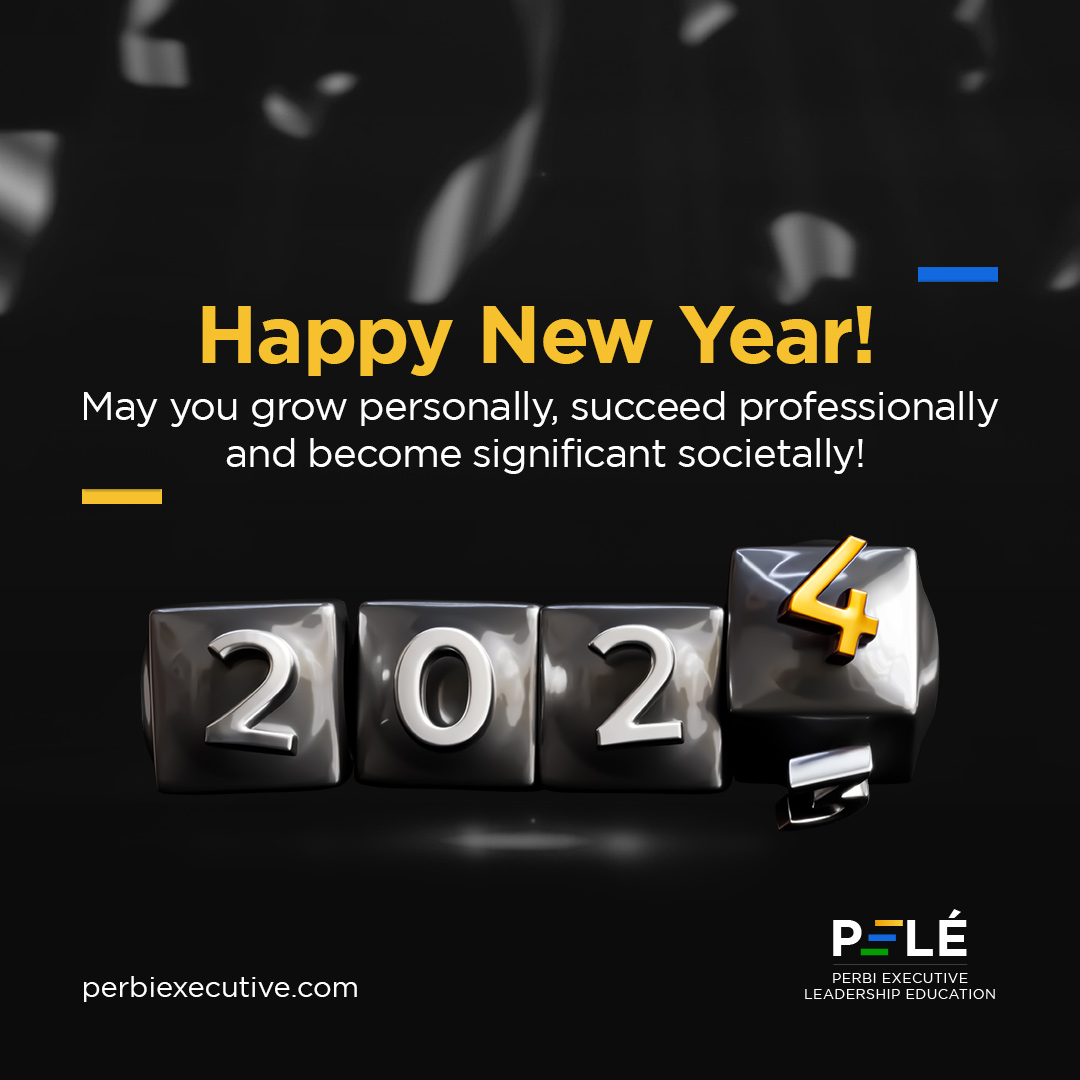
Guard Your January!
Happy New Year! Welcome to the first blog of 2024, a pep blog. The equivalent pep talk is available on Youtube here. Now, this is the the bottomline of this debut communication: Guard your January. Guard your January!
I noticed this many years ago, maybe 15 years ago, that as January go so does the rest of the year. And so although a lot of people take quite a while to get out of the yuletide mood and year-end festivities I realized over a decade ago that by the second day of the new year I needed to grab a hold of myself and start thinking about the rest of the year, prayerfully planning etc.
So for instance at The HuD Group, a holistic emerging leadership development organization I co-founded 20 years ago and now has has work in about 25 countries on all continents, one thing we do and mobilize others to join us in is that from the 2nd to the 22nd of January every year we have a focused time of fasting and praying. We call it P3 or PPP because it’s a time of Prayer, Purpose and Planning.
Now, even if you’re not a person of faith you probably still agree, at least, that you are not just a piece of matter. You are here by the intentional creation of an intelligent Designer who has you here on purpose to fulfill His mission for your life. And so, think about your God-given purposes in January. Why are you here on Earth? Why has God given you another year? (Not everybody made it into 2024, don’t forget).
If you need some guardrails, you’re here to reflect your Creator in your being and your doing and so think about your purpose in 2024 in terms of
–Character (will you be a godly or God-like leader? In what ways?)
–Community (who are you going to intentionally hang out with this year, from family and friends to fellowships?)
–Celebration (what’s going to be the central joy of your life, ultimately how are yougoing to bring delight to your Creator a.k.a. worship)
–Contribution (as one “born to rule through service given” how are you going to lead differently in 2024?)
–Commission (you have an obligation to form godly, effecual leaders too; and better still when you can do it from the inside out with the redemptive power of God that comes from believing in the finished work of Jesus Christ on the cross).
As you think about these God-given and practical purposes, prayerfully consider each and plan your year accordingly. Don’t just be engaged in activities and running around in January–especially from program to program–because as January goes so does the rest of the year. Personally, I hardly take speaking appointments in January and I rarely travel in January because I realized many years ago that is a time to be focused, to be prayerfully intentional about the rest of the year. Last year I violated that, taking on what I thoutht was an ‘unmissiable’ speaking engagement in Kenya. Let’s just say I paid for it dearly.
May you grow in this practice of putting first things first, and in such a profound way that leads to more success this year and even more significance. Remember: guard your January! That’s my pep talk and blog, my first pep talk and blog, for you in 2024.
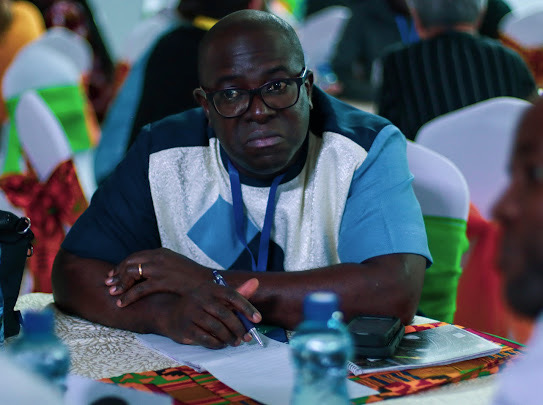
Leading with Courage 1: Dealing with Difficult Discussions.
All is set for a life-saving operation. On the surgical table lies a man whose continued living depends on the amputation of a diabetic foot that is giving the rest of his body hell. The renowned surgeon dashes in, marks a leg, drapes it quickly and begins to swab it, disinfecting the operating area for action. Then a sudden realization hits his scrub nurse like a thunderbolt. That is not the limb to be amputated. Would she have the courage to bring up this crucial conversation for a timely intervention? No. She remains silent. The wrong leg is amputated.
At the invitation of The Association of International Certification Schools (ASICS) in Ghana, PELÉ delivered a Masterclass on Leading with Courage: Navigating Difficult Discussions. This was at the Airport View Hotel in Accra. This is the second time engaging this body of leaders–founders, proprietors and C-level executives–of private schools that run either the Cambridge or International Baccalaureate programmes. At their Revive annual retreat in the Volta Region last year, the PELÉ team delivered a two-hour workshop on Leading with Self-Awareness, which included sharing an analysis of the DISC personality assessment of each of the ASICS council members and the potential areas of synergy as well as conflict as a team.
Scenarios
Dealing with difficult discussions could produce humorous scenarios like the banter between two of the richest people on the planet, Mike Zuckerberg and Elon Musk, that just might end up in an entertaining duel. It will be a sight for sore eyes should they actually, eventually, get into that much-talked about cage fight. However, not navigating difficult discussions well (or at all) could end up in sheer disastrous situations, like the surgeon (above) who amputated the wrong leg just because his scrub nurse couldn’t bring herself to raising that ‘crucial conversation’ when she noticed the wrong leg was being marked and swabbed for surgery. The anticipated pain we fear and so keep silent turns out better than the actual disaster that occurs because of our silence. Yes, often there is no pain per se beyond the little discomfort; but even when there is, it is better than we thought. Much better. How many organizations are disastrously amputating wrong legs because the right mouths won’t speak?
Difficult discussions or ‘crucial conversations’ may range from high-level, multilateral Israeli-Palestinian issues to simpler organizational ones like delayed projects and presiding over a poor performance review to as personal as employee body odour or bad breath.
Hard Questions about Hard Situations
Since “thinking begins when you ask really difficult questions” (Slavoj Zizek), let’s ask a few Lencioni ones (from The Motive):
1. Do you organize “team-building” activities for your team that are fun but that largely ignore uncomfortable conversations about their collective behaviours?
2. Would you rather learn to live with a person’s difficult behaviours than endure an awkward, potentially emotional discussion with them?
3. Do you find yourself venting about your direct reports’ or other stakeholders’ behavioural issues rather than talking with them directly?
4. Do you find yourself saying about potential uncomfortable conversations, “I don’t have time for that” or “I can’t waste my energy on this”?
If you answered ‘yes’ to any of the above four questions, you are a candidate for the Dealing with Difficult Discussions workshop.
One of Five Things C-level leaders Suck at
In his no holds barred book, The Motive, Patrick Lencioni observes that reward-centered leaders find the following five responsibilities tedious, uncomfortable, plain hard: 1. Developing the Leadership Team, 2. Managing Subordinates (and making them manage theirs), 3. Having Difficult and Uncomfortable Conversations 4. Running Great Meetings 5. Communicating Constantly and Repetitively to Employees. Smack in the middle of the junk pile is abdicating dealing with difficult discussions.
So, while these ASICS leaders are already prone to shirking their responsibility to navigate uncomfortable and difficult conversations just by virtue of being C-level leaders too, the ones who are African have the odds stacked against them even more as “high-context nations prefer the avoiding and obliging conflict styles more than low-context nations” (Croucher et al, 2012).
What to do
So what leaders need is a mindset shift as well as a new skillset. The saving paradigm is this: “Effective team-building always involves emotional and uncomfortable conversations” (Lencioni). Every leader worth their salt knows ‘it comes with the territory’ and the response-able thing to do is to deal with it response-ably. There is no true success in life or leadership without having to deal with difficult discussions. Navigating difficult discussions has more to do with YOU than the issue(s) or the other person(s) involved: one’s motives (for leadership), personality style (assessable via the DISC) and values. This is why whenever we can, we would rather run the Leading with Self-Awareness masterclass or workshop first, since these are only three of eighteen factors we bring to the fore that leaders must be self-aware of.
Ín terms of skills, the new skillset involves a couple of tools. One of the tools to practice is known as Climbing the Ladder of Integrity. In our 150-minute workshops, we invest at least half-an-hour of practicing this skill and getting feedback. Not so much for confronting someone per se, but for first getting clear within yourself.
Concluding with Courage
Leading with courage, really, is leading with heart (don’t forget ‘heart’ is cœur). With this courage, which is not the absence of fear but the taking of action forward in spite of it. In the words of former U.S. president Franklin D. Roosevelt, “Courage is not the absence of fear, but rather the assessment that something else is more important than fear. Progress.” Remember the anticipated pain we fear and so keep silent? Even the Madiba, Nelson Mandela, confesses: “I learned that courage was not the absence of fear, but the triumph over it. The brave man is not he who does not feel afraid, but he who conquers that fear.” May we too, like him, learn this and lead with heart–courage, character, compassion, competence–navigating ‘crucial conversations’ and difficult discussions.
PELÉ’s vision is a global ecosystem of authentic leaders characterized by healthy growth, holistic success and lasting significance. Consequently, we are on a mission to offer authentic and customized relationships and resources to C-level executives to grow personally–including dealing with difficult discussions–to succeed professionally, and become significant societally.
REFERENCES
Patrick Lencioni (2020): The Motive: Why So Many Leaders Abdicate Their Most Important Responsibilities. The Table Group.
Stephen M. Croucher, Ann Bruno, Paul McGrath, Caroline Adams, Cassandra McGahan, Angela Suits & Ashleigh Huckins (2012): ‘Conflict Styles and High–Low Context Cultures: A Cross-Cultural Extension,’ Communication Research Reports, 29:1, 64-73. Link to this article: http://dx.doi.org/10.1080/08824096.2011.640093
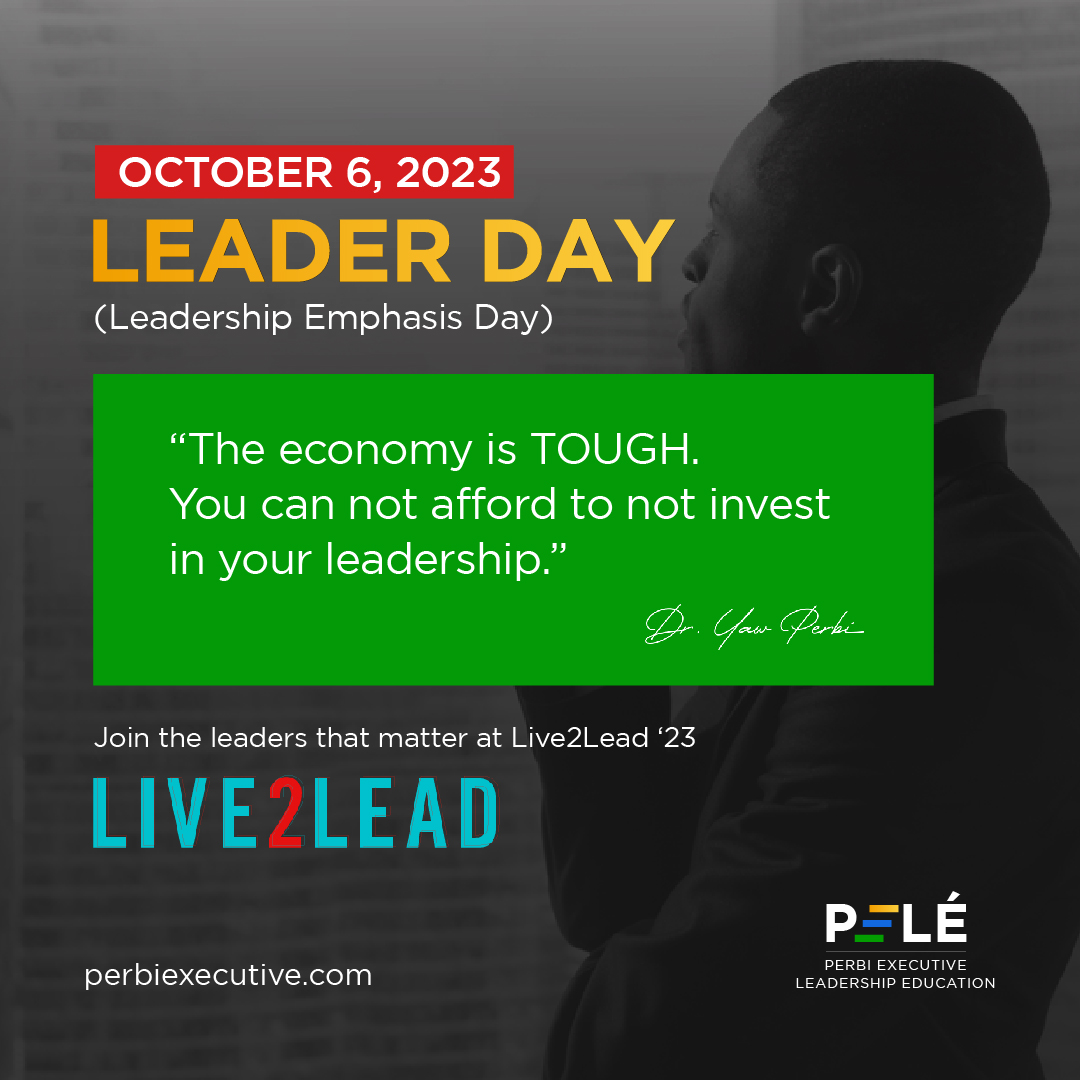
Live2Lead 2023: Leader Day Comes Again This Year.
There was recently a humorous corporate piece where the smart CFO said to the CEO, “We can’t afford to invest all this money developing our leaders. What if they leave?”
To which the wiser CEO replied, rather curtly, “What if we don’t invest in our leaders and they stay?”
You would think that “because the economy is tough let’s hold off the ‘luxury’ of leadership development” yet the irony is that precisely because the economy is tough you cannot afford not to grow your leadership to overcome the challenge and soar to new heights. What if the economy isn’t going to get better anytime soon. Will you survive? How will you survive, let alone thrive, if you don’t get better than you are now and better than the economy you live in?
THE FRUSTRATION LIVES ON, BUT SO DOES THE DREAM
Last year, my frustration was that “there is a day dedicated to almost every cause under the sun and pretty much each of the Sustainable Development Goals (SDGs)—women’s day, water day, literacy day, friendship day, founders’ day … even toilet day. Yet the one thing that causes each of these matters to rise or fall has no such day dedicated to it to elevate and emphasize it. Even then, is a day enough? Surely not; but it is a good catalyst for the remaining three hundred and sixty four (or five) days,” I said.
Last year, I shared a dream that “the first Friday of October each year will become universally known as LEADER DAY.” It bears repeating that, “There is nothing special about the first Friday in October per se except that consistently for about a decade now, our mentor and leadership expert, John C. Maxwell, has been gathering some of the best leadership minds and hearts on the planet to speak to the issue, and we might as well leverage the opportunity rather than reinvent the wheel. Live2Lead is the name of that event. The name says it all, that’s our purpose on earth: We live to lead.”
We held a successful event last year, only online, looking at the theme “Leading with Integrity & Inspiring Hope, for the Common Good.” To say Patrick Awuah (Founder & CEO, Ashesi University), Patricia Obo-Nai (CEO, Vodafone), James Ebo Whyte (CEO, Roverman Productions), Gwen Gyimah Addo (CEO, The Hair Senta), and Kathleen Addo (Chairperson, National Council for Civic Education) were phenomenal resource persons is an understatement. We will bring you snippets, in text and video, of what they shared to remind and stimulate you towards integrity and hope for your leadership.
LEGACY THIS TIME
This year, two more John C. Maxwell-trained and certified colleagues in Ghana have joined our trio of 2022 to pour more fire into the dream that ultimately the first Friday of October each year will become universally known as LEADER DAY. We have settled on ‘Leadership Legacy’ as the theme and will soon be outdooring the slate of speakers, including my celebrated German-trained professor of Cardiosurgery when I was a medical student at the University of Ghana Medical School. We’ve got to live to lead today, for the sake of lives tomorrow. That’s legacy.
You and I know too well the dearth of leadership in our country and around the world, whose ripple effect is the tough economic situation we find ourselves in, and more. We hope to double last year’s number of attendees–this time both online and in-person at the Ecobank Ghana headquarters auditorium–to benefit from the LIVE simulcast from Atlanta and the local content for our context, sandwiching the global feed.
CONCLUSION
When leaders get better, everything and everyone gets better too. There is no benefit of not investing in your leadership to get better because the economy is tough. Ironically, the only way out is for you and everyone else to invest in our leadership development to get better. That is the tide the raises all the boats with it, including the economy. In the words of the charming African-American poet Maya Angelou, “Do the best you can until you know better. Then when you know better, do better.” Mark down Leader Day 2023, October 6, to know better, get better and do better.
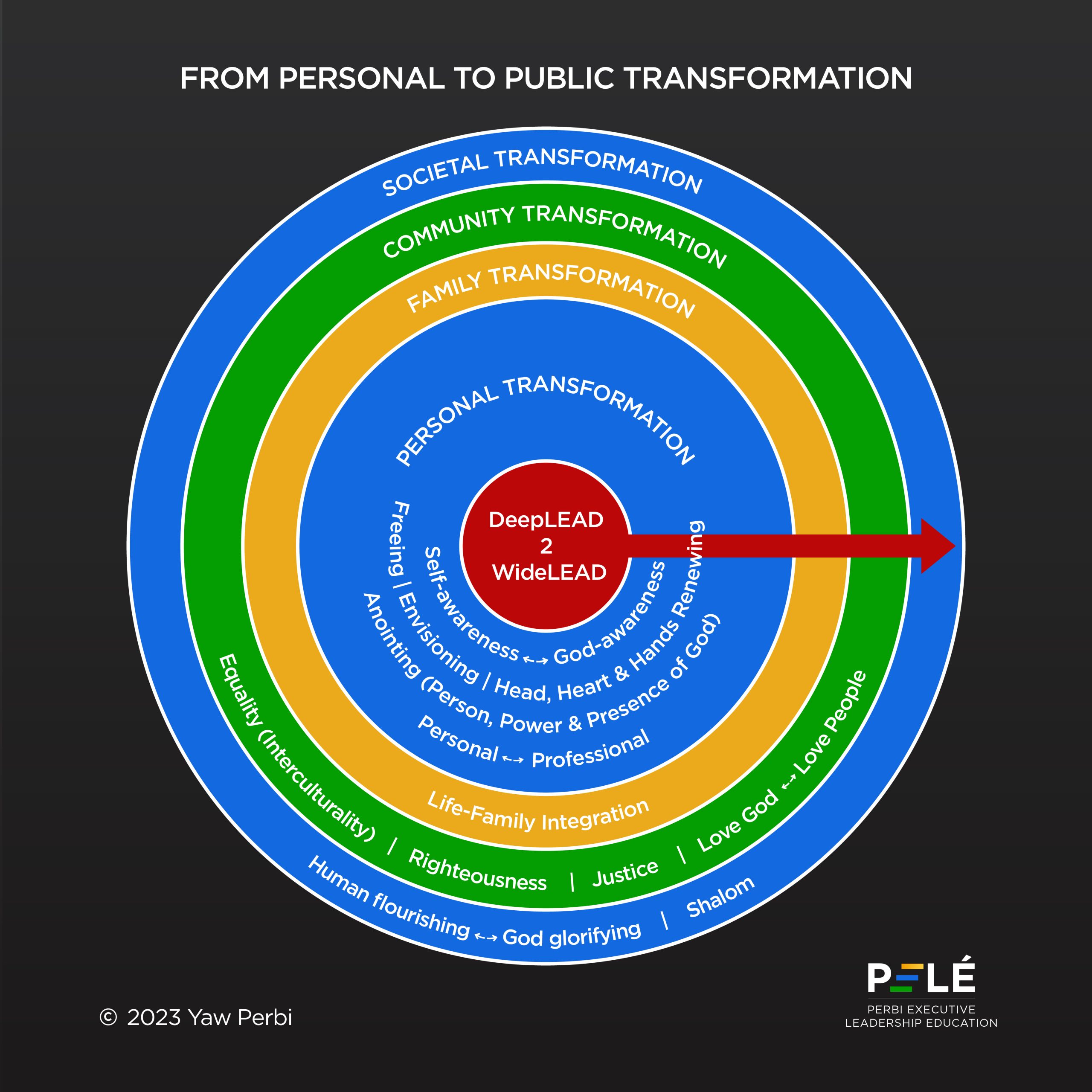
The Throes & Trajectory of Transformational Impact
Over 500 American-Africans—my way of describing Africans who have more recently in the last one or two generations become Americans—gathered in no less a place than the Lord Baltimore Hotel in the downtown of that Charm City of Maryland which bears the same name as the hotel. One of the interesting trivia that decorated the elevators at the hotel is that Martin Luther King Jnr. held his April 2, 1965 press conference at this same historic venue.
The theme chosen for this biannual national conference of these American-African professionals known as the African Christian Fellowship (ACF) USA was Transformational Impact. Yours truly was one of two keynote speakers, who both happened to be medical doctors who hailed from West Africa, Ghana and Nigeria specifically.
While my first keynote was an hour-long and had seven points about transformational impact—text, tales, theology, tracks, teleological definition, theory and tenets—I only seek to share the crux of the key note with you in this short write-up. I shall share the teleological definition of transformational impact which I came up with after reading many others online and found none fully satisfying my take on the subject. And then I’ll share my theory of change, theory of how transformational impact actually happens.
Definition of Transformational Impact
Transformational Impact is the process of deeply internally changing in one’s being and doing in order to have, or participate in an attempt at, external profound, authentic and sustainable positive change. If you are anything like me, when you hear transformational impact you’re thinking about doing some thing to change something or someplace or someone. The paradigm shift in this definition is that transformational impact has two points of change—first, of the person seeking an intervention and then of the circumstance or situation. That brings us to the theory of change.
Theory behind Transformational Impact
Why is this definition like this and super important? Because we cannot deeply change anything without being deeply changed ourselves first. Here is the theory of change that goes with the issue of transformational impact: Only deeply transformed leaders can deeply, authentically and sustainably transform society.
This is not the first time I’ve written on this. I remember bringing it up when there was a massive trending in Twittersphere of the hashtag #fixthecountry in a certain West African state and a counter #fixyourself that was attempted to quench the fire. In the article, I share why both camps were wrong. It goes back to the theory behind transformational impact.
There cannot possibly be authentic transformation when the actor isn’t themselves in sync with what they’re acting upon. Besides, if there isn’t transformation of the protagonist themselves, their intervention wouldn’t last long—either their work will unravel with time or they themselves will be marred in no time.
You might now understand why this definition is important. One’s identity and character (being) and actions and activities (doing) first need below-the-surface transforming internally in a deep manner if the outward impact they seek will also be profound, real/authentic and last.
In fact, without going too much into the theology of transformational impact, let me state that God first shapes the people through whom He wants to shape the world so that they can reflect Him and reform His world by His shaping—in His image and likeness—to His glory.
Widening Circles of Transformational Impact
Above is an attempt to illustrate how it’s a DeepLEAD at the core which leads to WideLEAD, from personal transformation to public transformation. We can’t go wrong if it’s first our deep personal transformation that leads to family transformation, community transformation (from church to corporation) and then societal transformation.
Elsewhere I’ve written about how people like William Wilberforce, Zaccheus the Tax Man and Nelson Mandela transformed their societies and world because they had first been deeply transformed. In fact, the title of an opinion piece on Nelson Mandela in the Los Angeles Times which I really enjoyed captured the essence of transformational impact so succinctly: “Nelson Mandela transformed himself and then his nation.”
So did Martin Luther King, who first darkened the doors of the Lord Baltimore Hotel a whole 60 years before I and the 500 plus American-Africans would a couple of weeks ago. Where any of these transformationally impactful leaders missed a step in the transformational impact process, they too paid for it in their personal, family, community or national life. Principles are no respecter of persons or personalities.
Change First to Carry Forth Change
So now’s your turn. Your time has come. Change first personally to carry forth change societally. Former U.S. President Barak Obama and I differ when it comes to LGBTQI+ transformation but we agree on this: “Change will not come if we wait for some other person or some other time. We are the ones we’ve been waiting for. We are the change that we seek.” The astute Jewish lawyer who studied under revered Gamaliel once said, “For the creation waits in eager expectation for the children of God to be revealed.” The whole world waits to be transformed by a people transformed prior and still transforming in the process. We are transformed to bring transformation. How’s that going?
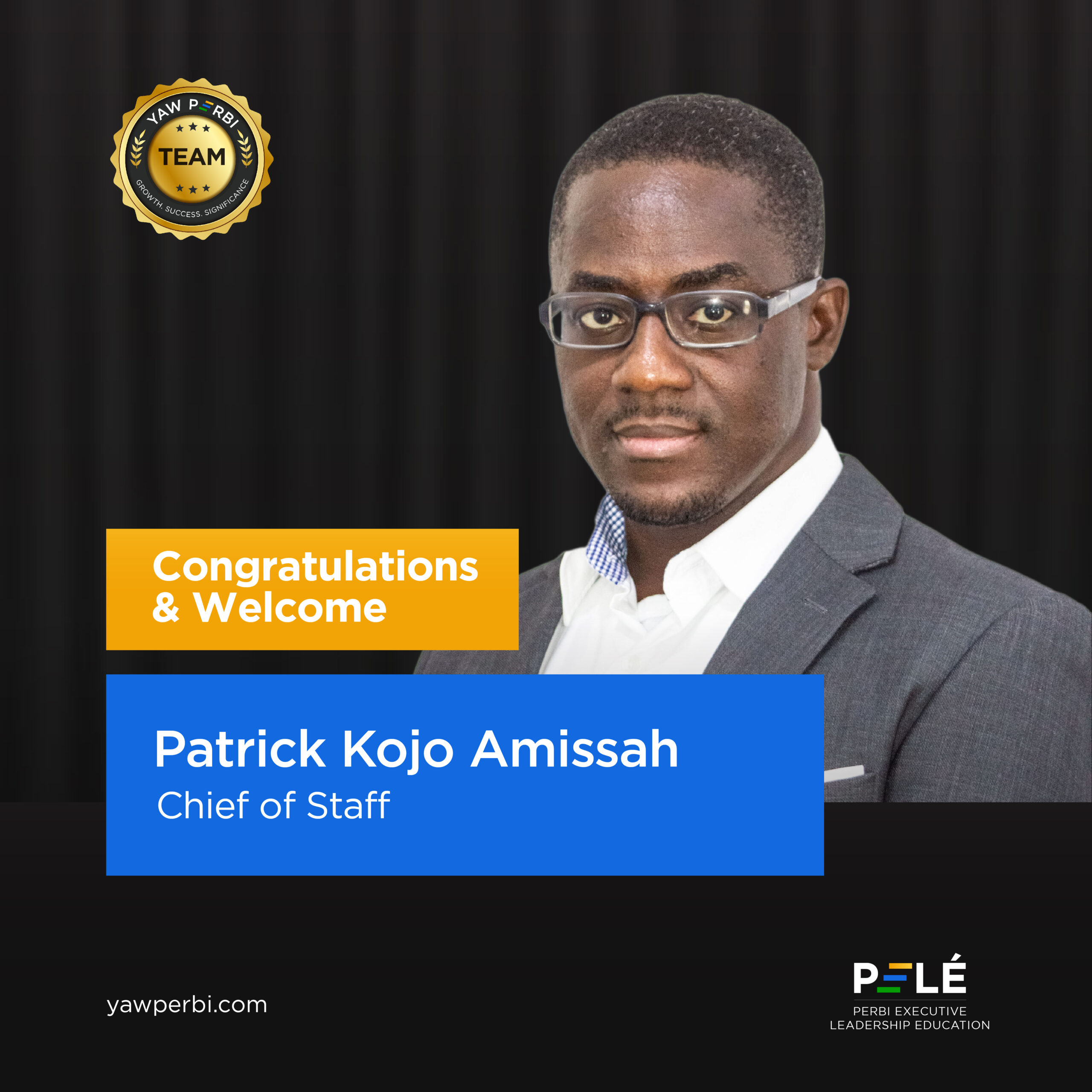
Perbi Executive Leadership Education (PELÉ) Gets New Chief of Staff: Introducing Patrick Kojo Amissah.
Perbi Executive Leadership Education (PELÉ) and allied Perbi establishments heartily welcome Mr. Patrick Kojo Amissah as our new Chief of Staff. Kojo Amissah is a versatile professional with experience in organisational leadership, team and operations management. He believes in striving for excellence and critically analysing problems with the goal of coming up with practicable, innovative solutions. He has worked in the educational, publishing and financial sectors.
Kojo’s previous work experience includes co-managing a start-up (Catalyst Learning Limited) and growing it into a sustainable firm. His responsibilities included structuring and establishing different roles and tasks, recruiting and training staff, establishing systems, managing finances, and planning and executing projects. For over three years he led in the development, printing and distribution of over five million copies of textbooks and workbooks to various schools across Ghana. He managed communications and relations with foreign printing firms including negotiating prices and planning the delivery of printed books.
We are convinced that the skills and knowledge gained from these experiences will enable him to quickly adapt to the demands of the Chief of Staff role at PELÉ and to exceptionally perform the outlined responsibilities. Mr. Amissah possesses good leadership and team management skills which he honed while serving as Team Leader, Curriculum Development and as Chief Operations Officer. Watch out for PELÉ’s online leadership courses to be launched by mid 2023.
Mr. Amissah developed important team building and conflict management strategies as he directly and indirectly managed over thirty individuals performing different roles. He also possesses good negotiation skills and valuable stakeholder management experience. At PELÉ, we believe these are important transferable skills that will aid his interactions with staff of Perbi Executive Leadership Education and affiliated organisations like Perbi Cubs, Kwiverr, The HuD Group, Send Africa, Adeshe Real Estate, ISMCanada, PAIS, Africa to the Rest, BCA Leadership, the Lausanne Movement etc. Kojo takes the baton from Ashesi cum University of Warwick alumna Araba Andoh who laid pioneering tracks for the role.
According to Kojo, “I am highly motivated to serve in the role because it provides the opportunity for me to put my unique mix of experience in leadership, operations management and publishing to use in the worthy cause of growing executives to make significant impact in society. I also believe that working directly with an accomplished leader and entrepreneur like Dr. Yaw Perbi is an unmissable opportunity to grow professionally.” Among Kojo’s first tasks will be helping to host the incoming BCA Leadership Made in Africa Leadership Conference, launching PELÉ’s avant-garde DeepLEAD online leadership course and providing operational support for both The HuD Group’s 20th anniversary activities and Kanéval by PerbiCubs/UNESCO Accra World Book Capital. In commemoration of the latter, Dr. Yaw Perbi seeks to (re)publish all his two dozen books.
We welcome Mr. Kojo Amissah at this inflexion point where YAW PERBI is transitioning to PELÉ (Perbi Executive Leadership Education) to maximize team potentials beyond the availability and capability of Dr. Yaw Perbi as an individual. PELÉ by YAW PERBI is an Executive Education firm that offers authentic and customized relationships and resources to C-Level executives to grow personally, succeed professionally and become significant societally. PELÉ’s vision is to see a flourishing global ecosystem of authentic leaders characterized by growth, success and significance.
Kojo wields a Bachelor’s degree from the University of Ghana and an MBA from Coventry University. He is a practising catholic. Akwaaba, Kojo. Bienvenue, Monsieur Amissah. Here’s to your own growth, success and significance. Together, let’s carpe diem and make a dent in the universe!

Introducing PELÉ (Perbi Executive Leadership Education).
Imagine a flourishing global ecosystem of authentic leaders characterized by healthy growth, holistic success and lasting significance. That’s the big dream and eternal hope fuelling our daily tasks at the Executive Education firm that bears my name, YAW PERBI. A couple of years ago, after eight years as President & CEO of a Canadian non-profit in the international education space and having garnered several years of executive leadership experience in the Ghanaian military and medical fraternity, global media, the United Nations in Cote d’Ivoire etc. I decided it was time to serve all of that to leaders of leaders: the C-suite. So I came out of sabbatical and stepped down as President of ISMCanada to do this.
Since according to my mentor of a quarter of a century, John C. Maxwell, by whom I’m officially a certified coach, speaker and trainer, that “one is too small a number to achieve greatness,” I have been steadily growing a global team of competent, caring, confident and character-based co-leaders on/from every continent in the world beyond myself to make our faith, sight. That journey has culminated in the birth of PELÉ.
A Play on Words
In keeping our focus on growing and coaching executive leadership to succeed, ever broadening the authentic relationships and resources we bring to bear on our task, we decided to move away from YAW PERBI specifically and to build Perbi Executive Leadership Education, PELÉ for short. PELÉ is not exactly just a happy coincidence, for as a once-upon-a-time football fanatic and soccer player for my elementary school, I recently engaged in my fair share of arguments about who the greatest soccer player of all time is between the shouts in favour of Lionel Messi after lifting the Qatar World Cup trophy on December 18, 2022 and the incessant calls to hallow the legendary Edson Arantes do Nascimento, better known by his nickname Pelé, who died eleven days later on December 29. As a double childhood hero—both of my dad and myself—I had been pondering a way to honour a Black man who gave everyone so much delight and so many people of his skin hue so much pride.
As I’ve stated before, “I am eager to particularly provide C-level executives of African descent with the paradigms, processes and tools necessary to maximize their potential, to be world class, take the world stage and make their dent in the universe.”
A Word In Play
Then came April 2023 when the Pelé Foundation and Sportv launched the “Pelé in the dictionary” campaign to pay tribute and recognise his legacy in other fields beyond sport. Of course his name has long been a synonymous with success and excellence, both of which are values of our Executive Education company, but now the great Brazilian forward and only human to have lifted three World Cup trophies officially had his name in the Portuguese dictionary. The adjective “Pelé” has been added to the Portuguese edition of the Michaelis dictionary to describe “someone out of the ordinary.”
Pelé, the nickname of the late football legend, has officially become tantamount to “extraordinary, exceptional, incomparable, unique.” Pelé is an adjective for something or someone that is out of the ordinary, one who by virtue of their quality, value or superiority cannot be equalled to anything or anyone, just like Pelé. For example, he is the Pelé of basketball, she is the Pelé of paediatrics.
What’s in a Name?
According to Emily Olson of NPR, “It was in the small, impoverished town of Bauru where he first got his nickname playing in youth leagues.” Apparently, even Pelé himself wasn’t sure where it came from, he wrote in a 2006 piece for The Guardian, but it may have been a play on Bilé, the nickname of a goalkeeper for the team Pelé’s father played on. “I can remember the name really bugged me at first. I was really proud that I was named after Thomas Edison and wanted to be called Edson,” he said. “I thought Pelé sounded horrible. It was a rubbish name. Edson sounded so much more serious and important.”
PELÉ by YAW PERBI is an Executive Education firm that offers authentic and customized relationships and resources to C-Level executives to grow personally, succeed professionally and become significant societally. To this end, the company provides Pelé services in leadership development, management training, executive coaching and publishing. Our Pelé coaching, authoring, speaking, and training are centred on LIFE—Leadership, Integrity, Family, Entrepreneurship.
Conclusion
We are PELÉ–extraordinary, exceptional, incomparable, unique–but more importantly, we form PELÉs, who are authentic, out of the ordinary executive leaders in every sector of life and all society’s centres of influence. As a forward-looking, authentic leader, if you want to dextrously dribble through LIFE and exceptionally hit goals like the legendary Pelé, you know where to look for the kind of coaching and training it will take: Perbi Executive Leadership Education (PELÉ). Like begets like.
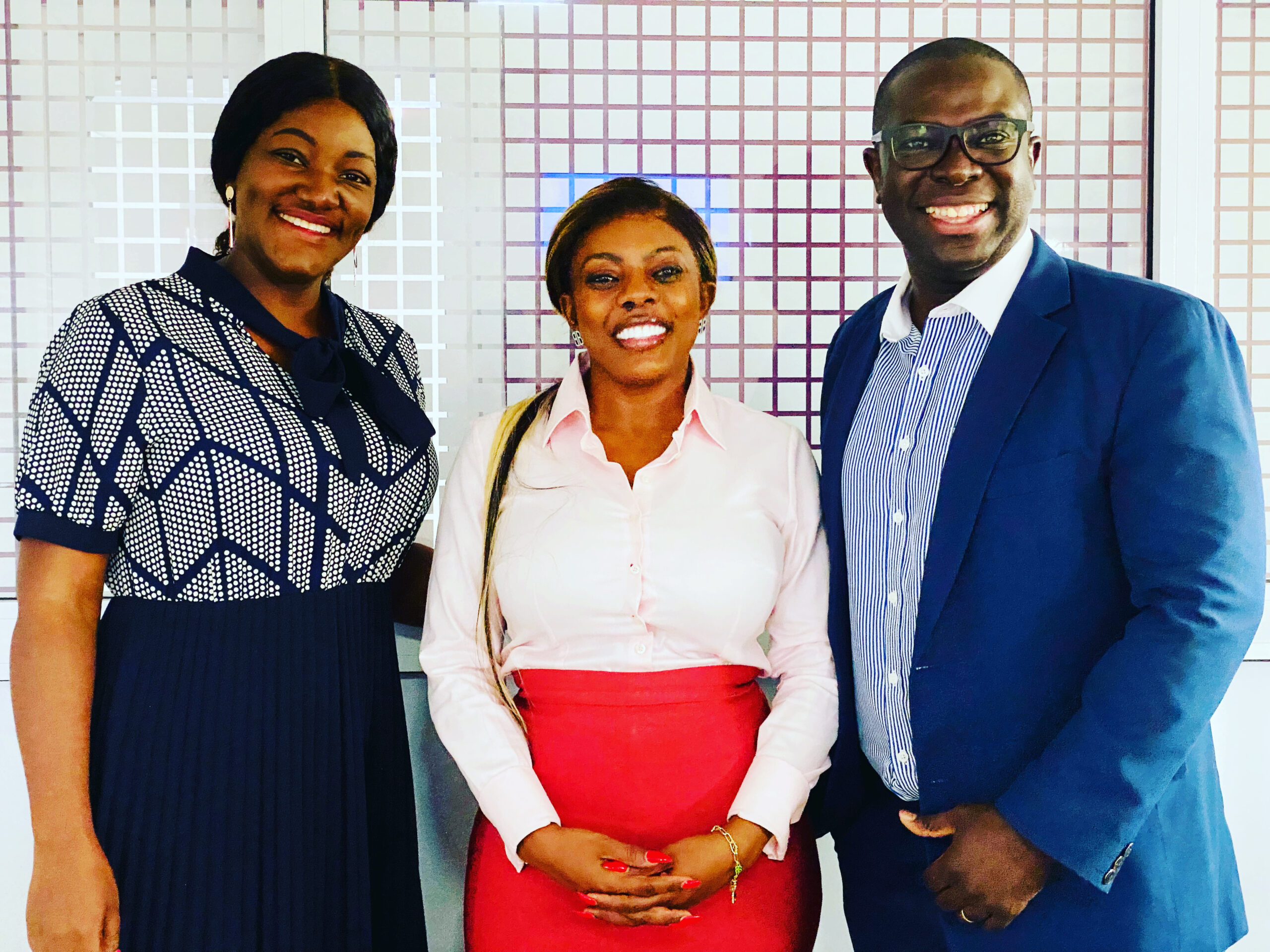
Of Kanévals, Kanébals & Kanévores.
Co-founders of Perbi Cubs sandwiching Kanéval partner-influencer, Nana Aba Anamoah, media personality & General Manager of GHOne TV/Starr FM.
This year, the capital city of Ghana where my wife hails from and where I was born has been named by UNESCO as its twenty-third World Book Capital. Accra takes over from Guadalajara, Mexico (2022) and will be handing the baton to Strasbourg, France come April 2024. Since ‘kané’ is the Ga word for read—and Ga being the language of the Accra people—Perbi Cubs Library services creatively replaced the near-homophonic ‘carni’ in ‘carnival’ with ‘kané’ and coined the word ‘Kanéval’ to bring fun to reading, which is otherwise unfortunately perceived widely as a bore and a chore.
As official partners of UNESCO Accra World Book Capital 2023 (AWBC ‘23), Perbi Cubs will be organizing Kanéval as a fantastic year-long program, a traveling fun fair transitioning from place to place with lots of amusements intertwined with lots of reading. You will find a fuller history of the UNESCO AWBC’23 partnership and details of the year-long fiesta here.
RESCUE FROM KANÉBALS
We are of the conviction that this Kanéval social service campaign needs to involve key influencers from all walks of life, from CEOs to Black Stars players to musicians, to consistently show that reading is fun and leads to success. The campaign will consist of various events in-person and online, including book fairs, storytelling sessions, and community outreach programs. By making reading fun and accessible, we can encourage more people to read and ultimately improve literacy rates in the community.
When we began approaching various influencers to join us on this reading revolution campaign, a massive behavioural change intervention, some of the stories we heard about the generally poor reading attitudes and habits of Ghanaian society were stupefying. We found kindred spirit in Nana Aba Anamoah (photo above), media personality and General Manager of GHOne and Starr FM, who unbeknownst to us had years back initiated a reading campaign known as ‘Raising Readers.’ She too had involved several influencers, including former Ghanaian president Jerry John Rawlings, to read with the children in a certain deprived area of Accra. Book donations in their thousands to the cause were a shot in the arm.
At some point it was clear parental involvement would bolster this behavioural change campaign. Some parent did accompany their children and wards to the reading sessions. Mostly reluctantly. In spite of these mostly illiterate parents sucking their teeth after only a little while, thinking of all the other more ‘productive’ ways they could be spending their time, Nana Aba and team pressed on. In fact, at the height of her intervention they had decided that once a week was not enough for the pace and profundity of the transformation they sought so they decided to leave books with the families and replace them when they returned the week after.
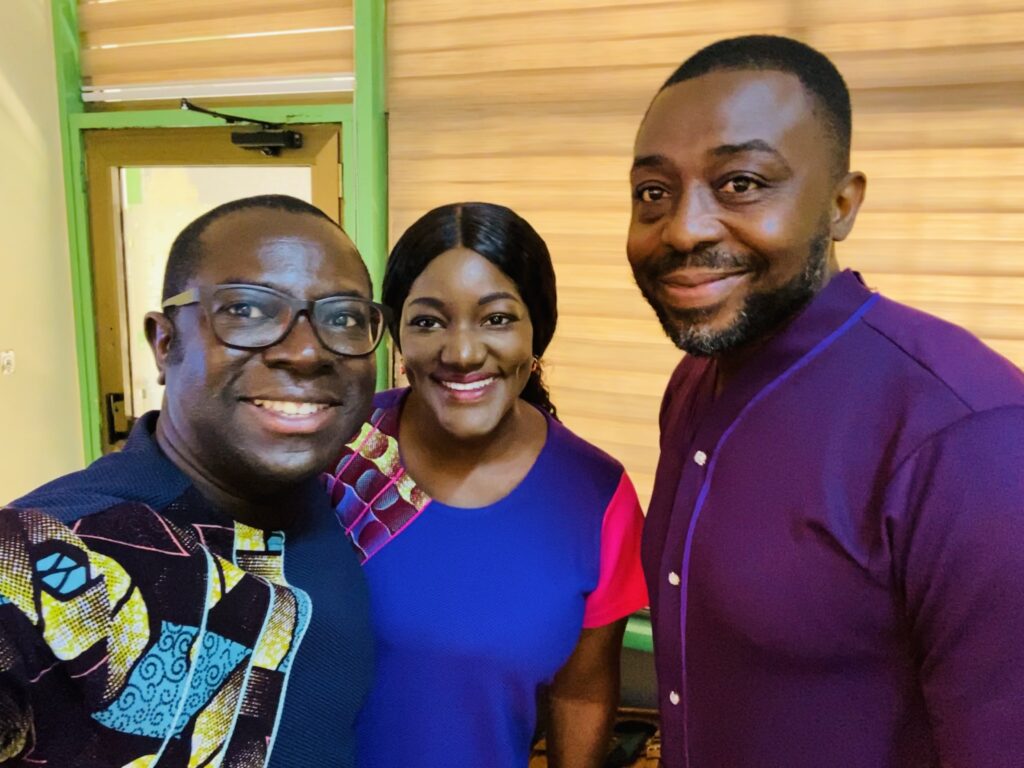
Cofounders of Perbi Cubs with yet another partner-influencer, Kafui Dey, author and GTV Breakfast host
All seemed well and good until the following week when some medical doctors on the Raising Readers campaign team who had gone down the road to grab some snacks returned with horror on their faces. When Nana Aba relates this story, she might not be aware but her face betrays the pain of the let-down she felt. The snacks that the team mates purchased in the catchment area had been nicely wrapped in freshly torn out pages of last week’s books! Kanébals (do you see what I’ve done with ‘cannibal’ and ‘kané’?) had dismembered the hitherto living literary friends, ripping them from their saddle-stitched and perfect-bound spines and repurposing the cadavers as food packaging. Ah!
When we related this story to another influencer on our bill, Kafui Dey (photo above), author and Breakfast host on GTV, he told us worse. Sometimes it’s pages of even the Bible that are Kanébalized for wrapping food!
WANTED: KANÉVORES IN THE KAPITAL
Perbi Cubs, convinced that readers are leaders and leaders are readers, has from inception sought to raise lion-leaders, hence the referral to our 10,000 young patrons as cubs (the young of lions) rather than the typical ‘kids’ (the young of goats).
By the end of the year-long Accra World Book Kapital, we seek to have enrolled an army of at least 100,000 cubs who are voracious readers, Kanévores. If carnivorous lions are the king of the jungle, we imagine that Kanévores rule the world.
KALL TO ACTION
According to UNESCO, as of 2021 only 6% of children in classes two and three in public basic schools could read and understand anything they read. Lack of sufficient reading resources and very large class sizes are among the root causes of the problem, but the overarching root cause is that society does not value reading. Reading is seen as a chore, a punishment or even a necessary evil! Yet per credible research, the love for reading is a stronger indicator of a child’s success in school and their future career than even their parents’ level of education and their socioeconomic status.

With media personality and reigning Ghanaian Journalist of the Year, Portia Gabor, at the TV3 studios in Accra. Portia’s partnering Perbi Cubs for this vital social intervention, Kanéval!
Join us in promoting the joy of reading and improving literacy rates in the community, particularly among children in public basic schools, by becoming a partner for Kanéval. Together, we can make a real difference in the lives of our community members and future generations. Let’s celebrate and make the most of Accra’s selection as UNESCO World Book Capital 2023.
KONCLUSION
Accra has been selected as UNESCO World Book Capital 2023 and Kanéval is a one-year social service campaign organized by Perbi Cubs, as official partners of UNESCO AWBC 2023, to celebrate this achievement and promote the joy of reading and improving literacy rates in the community.
The success of the campaign depends on a coalition of all stakeholders in the book industry, influencers, and strong partnership with the media. Together, through massive Kanévals all year, we can raise Kanévores and end apathy towards the written word that results in Kanébalism and the like. May readers rise and leaders come to light to transform society and impact the world—from Africa to the Rest.

The Ghanaian Dream is Not What You Think
Just before one of my recent trips out of Ghana, I asked the driver who usually takes me to the Accra airport if he would like to go with me for the experience (he’s never been airborne). His response wasn’t what I expected. I admired him for his brutal honesty and was deeply saddened at the same time. He said, “Dr. P, I won’t lie to you. If I go with you, I’m not coming back.” And he is not alone.
As I’ve been interacting with young people in Accra mainly, but in Ghana generally, it seems the Ghanaian dream is: to get out! i.e. to get out of the country to seek greener pastures. The Ghanaian dream is to exit the nation and l find that so sad on many levels. At the same time that excites me. Let me explain.
THE BAD, SAD & MAD
l find it sad in the sense that whatever the push factors are, they are potent enough to drive a collectivist society that is really keen on kith and kin, in other words one in which friends and family mean so much, to want to leave spouse and children, or parents, to go and struggle in another land just to keep body and soul together. What would make many of our people expire in the wilderness, literally die in the deserts of the Sahara en route to Libya and such, or be buried alive in the Mediterranean Sea between Africa and Europe in desperate attempts to get a better life?
Shame on the fathers and mothers who are making life impossible for our young people. I can totally understand why five hundred (500) years, or even two hundred (200) years ago, we would be forced to get into ships to sail to the Americas but today if anybody brought that same ship people will voluntarily fill it en mass and say, “Take me to the Americas, take me to the Caribbean, take me to Europe, take me to wherever. l want to work for whoever, for whatever; just to get out of here.”
I remember being in a conference last year at Cape Town, South Africa when someone did an incredible presentation on what Ghanaians and other Sub-Saharans go through in wanting to reach Europe by all means, literally. It was revealing how a revived craze is trying to go around the Senegambia coast to the Canary Islands, an Atlantic maritime route largely considered “the most dangerous sea passage for Africans trying to reach Europe.” Regarding the Sahara route, one of the funny but sad question was: “How many Africans can fit into the bucket of a Toyota Hilux pickup truck?” They say, “One more!” One more!! They keep filling and filling and filling these truck buckets with human beings and carry very little fuel and food supplies so they can travel light and transport more people. Whenever there is a breakdown or some delay, people die like flies. The dream becomes a nightmare. O WHY?
THE GOOD
On the other hand, what good can there be in all of this, legitimate and illegitimate attempts at migration alike? Why is there some excitement in my heart? There is titillation because God is a global God and he calls people whenever He wants wherever He wants them to accomplish His eternal purposes. Yes!
One day Paul of Tarsus, the lawyer-turned-preacher, was in Athens, Greece and delivered a ‘TED Talk’ at the Areopagus. Luke the doctor-turned-investigative writer records in parenthesis how “All the Athenians and the foreigners who lived there spent their time doing nothing but talking about and listening to the latest ideas” (Acts 17:21). “Ideas worth spreading,” TED would say. But I digress.
One of the things Paul shared was that God who made us all from one original man, Adam, is the one who determines our boundaries, where we live, and in what period or era in history (Acts 17:26-27). People movements are actually God movements. You see that throughout Scripture, from Genesis to Revelation. A personal attestation to this scriptural reality is how I never wanted to leave the land of my birth, Ghana, to be domiciled in another land, especially outside of Africa. I had no such plans. And I married a woman with a similar mindset. We were doubly resolved. Ironically, my wife, Anyele, was born in Canada and moved to Ghana when she was barely two years old but had no desire to return to the land of her birth. In fact, she had never used that Canadian passport to get back to Canada. Two dozen years later.
One evening in August 2006, God spoke to me so clearly. This was barely three weeks after we were married. I was in a Lausanne Younger Leaders conference near Kuala Lumpur in Malaysia when I heard this in my spirit: ‘It’s my world and l send you where I want you.” Huh! Then in January 2008, the LORD spoke very clearly to us both from Genesis 12. It was just our ‘usual’ morning devotion on an ‘ordinary day’ when these words literally jumped off the pages of scripture: “Leave your country, your people, and your father’s household. And go to a land I will show you.” With no such prior plans of ever leaving Ghana to school or work, in a dramatic fashion our lives were turned upside down. By June I was serving with the United Nations Operation in Cote d’Ivoire (peacekeeping soldier) as a military captain and medical doctor to the U.N. staff and troops mainly, and some local Ivorians. By July, Anyele had been ‘kicked out’ of Ghana too to Montreal, Canada, going to pursue her master’s in economics at McGill University. The first time she was back in two-and-a-half decades.
So that’s the exciting part, that God may be calling people to fulfill His grand purposes in the Arab States, Europe, in another Africa country, the Americas, Australasia… wherever. But l pray that we would be able to help those who are going to go well. And also let our contacts in their destinations receive them well. It behoves on the Church in Ghana, in particular (which accounts for over 70% of the population), to find a way to prepare people well, including blessing them with a healthy diaspora missiology, so they may go well and thrive. It cannot be overemphasized that merely getting to America, Europe or China, is no guarantee one will be successful. We give money to poor people in Canada. There are homeless beggars who have come to squat on our property in America. And the poor in the West are not of only one colour of skin.
Having said that, surely we can do more, much more, to help whoever longs to, or is called to, stay in the land of their birth and make it in Ghana, Nigeria or anywhere in Africa, to be able to make it well also, and very well for that matter.
WHAT’S BEST FOR YOU
Find out what God’s great purpose and plan, position and place (including geographical location) is for your life, for the One who made and redeemed you is a global God. It might not be what you thought. Bottomline: You are only going to prosper where God has purposed and planned you to be planted. Make sure you are planted by God in that place–whether it is in Africa or elsewhere–and in that particular period, where and when you will prosper. Think on these things.
Post Script
Here’s a PEP Talk on ‘The Bad & Good about the Ghanaian dream.’

